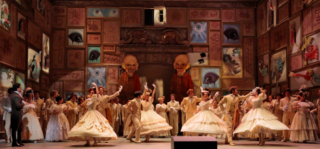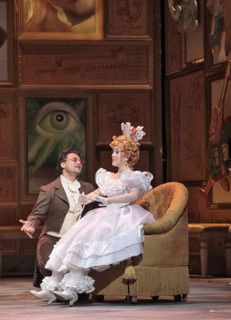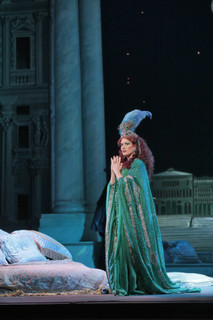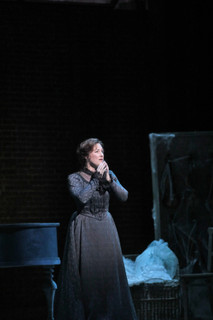|
Back
Convincing night vindicates rocky opening Los Angeles
Dorothy Chandler Pavilion
03/25/2017 - and March 30*, April 2, 6, 9, 15, 2017
Jacques Offenbach: Les Contes d’Hoffmann
Vittorio Grigòlo (Hoffmann), Diana Damrau (Antonia, Stella), Kate Lindsey (Nicklausse, Muse), Kate Aldrich (Giulietta), So Young Park*/Liv Redpath (Olympia), Nicolas Testé/Wayne Tigges (singing from the pit 3/25/17)/Christian Van Horn* (Lindorf, Coppélius, Dapertutto, Dr. Miracle), Christophe Mortagne (Andrès, Cochenille, Pitichinaccio, Frantz), Rodell Rosel (Spalanzani), Sharmay Musacchio (Voice of Antonia’s mother), Brian Michael Moore (Nathanël), Theo Hoffman (Hermann), Kihun Yoon (Luther), Daniel Armstrong (Schlémil), Nicholas Brownlee (Crespel), Reid Bruton (A bass voice)
Los Angeles Opera Chorus and Orchestra, Grant Gershon (Chorus Director), Roberto Cani (Concertmaster), Plácido Domingo*/Grant Gershon (Conductor)
Marta Domingo (Conception/Stage Director), Giovanni Agostinucci (Set and Costume Designer), Alan Burrett (Lighting Designer), Kitty McNamee (Choreographer), Ed Douglas (Fight Director) 
(© Ken Howard)
Historically, Les Contes d’Hoffmann has been jinxed by its share of misfortunes which seemed to wend their way into Los Angeles Opera’s 2002 re-staging on opening night. Debuting Diana Damrau’s post-bronchitis condensed her vocal assignment to only one heroine while husband, Nicolas Testé, was forced to lip-sync to Wayne Tigges’ notes in the pit due to throat issues. The strategy got them through in a pinch, but that wouldn’t pass muster in subsequent performances. In the midst of rehearsing Norma for Dallas Opera, enter Christian Van Horn, who stepped into chapter two of this calamity as the villainous savior. With issues resolved, broadly speaking, this Hoffmann really held its ground.

V. Grigolo, S. Y. Park (© Ken Howard)
Vittorio Grigòlo has not been seen in town since 2011 when he debuted in Gounod’s Roméo et Juliette, a performance that sputtered early-on for him though it was transformed into something delectable. Here, we find him in the eponymous role with nonstop charisma and emphasized power and passion. As he demonstrated in Roméo et Juliette, once again, Plácido Domingo led the three and a half hour-plus opéra fantastique with a molasses tempo inside the Prologue and Act I, yet the languid pacing actually helped magnify Grigolo’s antics and dividends were reaped. Lethargy continued to plod inside the “Olympia Act.” Thankfully, So Young Park’s automaton rang solidly both in physical context and improvisational fioritura. If the scene appeared overly buffa, it was definitively inflamed by Rodell Rosel’s effected Spalanzani and aid of mechanical diction by Christophe Mortagne’s Cochenille while Giovanni Agostinucci’s set modification of the three-paneled ballroom bore a heavier gallery of Offenbachian caricatures, a visual agent accentuating the tableau’s absurdities.

K. Aldrich (© Ken Howard)
When the curtain lifted on Act II, Maestro Domingo’s pacing suddenly turned with momentous ambition, most evident in the “Barcarolle” featuring a “Tale of Two Kates”: Hoffmann’s muse, Nicklausse (Kate Lindsey) and Kate Aldrich’s Giulietta. Written for two mezzo-sopranos, the two registers blended well during the duet, nicely brisk and fluffy in returns despite both voices being absorbed by stints of a boisterous orchestra. Back in 2011 Ms. Lindsey sang Zaida in Rossini’s Il turco in Italia, and in Hoffmann she’s a well-suited Nicklausse, comfortable and assured. Her lower range has a smoky flow with a sense of stabilization as opéra comique’s diplomatic Muse, assuaging fantasy and reality. This act bristled during Vittorio Grigòlo's “Amis, l’amour tendre et rêveur, erreur!” While Maestro Domingo shifted forward, M. Grigòlo awkwardly lagged and resisted…in the end the conductor prevailed. Kate Aldrich’s occasionally shrill temperament, nonetheless, elicited lovely understated seduction, though her emerald green dress seemed to encumber.

D. Damrau (© Ken Howard)
The most poignant of the three tales lies inside the “Antonia Act” and the masterful interpretation rendered by Diana Damrau. Adding to Jacques Offenbach’s persuasive music, we find Ms. Damrau’s Antonia riveting yet pathetic as the fragile young lady who is suffused by Van Horn’s Dr. Miracle. No apparent signs of earlier strains surfaced within the soprano’s singing, and her breath control and stamina consumed the listener.
Similar in scope to John Relyea, Christian Van Horn gifted four-fold with his deep bass-baritone register…justifiably so since he was undoubtedly the lynchpin for Les Contes d’Hoffmann. Devilishly nuanced with impish extensions and haughty demeanor, the timbre became a dominant and eerie compound that contributed deeply to Offenbach’s brilliant musical landscape; his “Scintille diamant” aria was superbly crafted and radiant.
Unfortunate events can unfold in any opera, but this iteration of Offenbach’s posthumous work prevailed.
Christie Grimstad
|